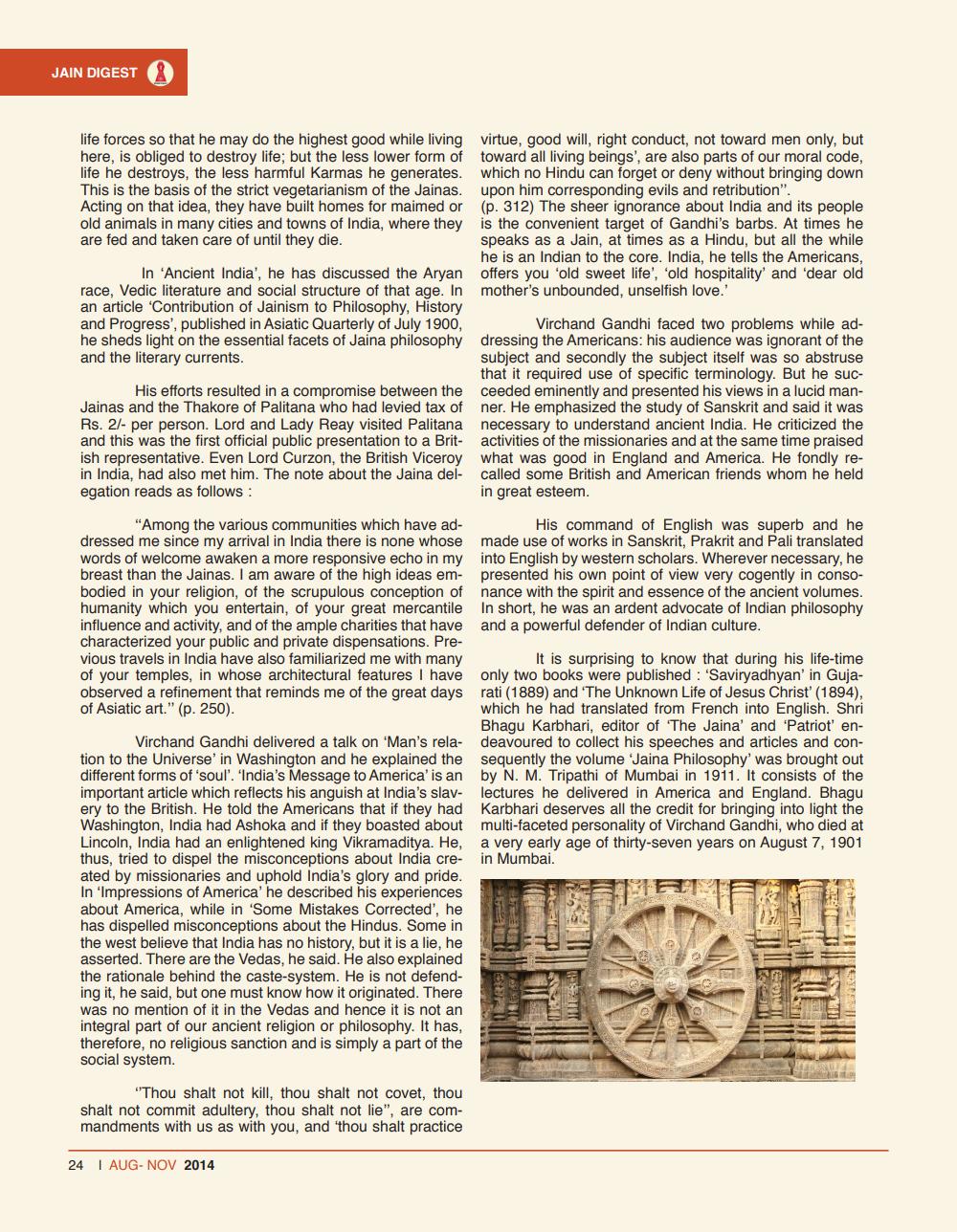________________
JAIN DIGEST
life forces so that he may do the highest good while living virtue, good will, right conduct, not toward men only, but here, is obliged to destroy life; but the less lower form of toward all living beings', are also parts of our moral code, life he destroys, the less harmful Karmas he generates. which no Hindu can forget or deny without bringing down This is the basis of the strict vegetarianism of the Jainas. upon him corresponding evils and retribution". Acting on that idea, they have built homes for maimed or (p. 312) The sheer ignorance about India and its people old animals in many cities and towns of India, where they is the convenient target of Gandhi's barbs. At times he are fed and taken care of until they die.
speaks as a Jain, at times as a Hindu, but all the while
he is an Indian to the core. India, he tells the Americans. In 'Ancient India', he has discussed the Aryan offers you 'old sweet life', 'old hospitality' and 'dear old race, Vedic literature and social structure of that age. In mother's unbounded, unselfish love.' an article 'Contribution of Jainism to Philosophy, History and Progress', published in Asiatic Quarterly of July 1900,
Virchand Gandhi faced two problems while adhe sheds light on the essential facets of Jaina philosophy dressing the Americans: his audience was ignorant of the and the literary currents.
subject and secondly the subject itself was so abstruse
that it required use of specific terminology. But he sucHis efforts resulted in a compromise between the ceeded eminently and presented his views in a lucid manJainas and the Thakore of Palitana who had levied tax of ner. He emphasized the study of Sanskrit and said it was Rs. 2/- per person. Lord and Lady Reay visited Palitana necessary to understand ancient India. He criticized the and this was the first official public presentation to a Brit- activities of the missionaries and at the same time praised ish representative. Even Lord Curzon, the British Viceroy what was good in England and America. He fondly rein India, had also met him. The note about the Jaina del called some British and American friends whom he held egation reads as follows:
in great esteem.
"Among the various communities which have ad
His command of English was superb and he dressed me since my arrival in India there is none whose made use of works in Sanskrit, Prakrit and Pali translated words of welcome awaken a more responsive echo in my into English by western scholars. Wherever necessary, he breast than the Jainas. I am aware of the high ideas em- presented his own point of view very cogently in consobodied in your religion, of the scrupulous conception of nance with the spirit and essence of the ancient volumes. humanity which you entertain, of your great mercantile In short, he was an ardent advocate of Indian philosophy influence and activity, and of the ample charities that have and a powerful defender of Indian culture. characterized your public and private dispensations. Previous travels in India have also familiarized me with many
It is surprising to know that during his life-time of your temples, in whose architectural features I have only two books were published: 'Saviryadhyan' in Gujaobserved a refinement that reminds me of the great days rati (1889) and 'The Unknown Life of Jesus Christ' (1894), of Asiatic art." (p. 250).
which he had translated from French into English. Shri
Bhagu Karbhari, editor of The Jaina' and 'Patriot' enVirchand Gandhi delivered a talk on 'Man's rela- deavoured to collect his speeches and articles and contion to the Universe' in Washington and he explained the sequently the volume Jaina Philosophy' was brought out different forms of 'soul'. 'India's Message to America' is an by N. M. Tripathi of Mumbai in 1911. It consists of the important article which reflects his anguish at India's slav- lectures he delivered in America and England. Bhagu ery to the British. He told the Americans that if they had Karbhari deserves all the credit for bringing into light the Washington, India had Ashoka and if they boasted about multi-faceted personality of Virchand Gandhi, who died at Lincoln, India had an enlightened king Vikramaditya. He, a very early age of thirty-seven years on August 7, 1901 thus, tried to dispel the misconceptions about India cre- in Mumbai. ated by missionaries and uphold India's glory and pride. In 'Impressions of America' he described his experiences about America, while in 'Some Mistakes Corrected', he has dispelled misconceptions about the Hindus. Some in the west believe that India has no history, but it is a lie, he asserted. There are the Vedas, he said. He also explained the rationale behind the caste-system. He is not defend
Sed ing it, he said, but one must know how it originated. There was no mention of it in the Vedas and hence it is not an integral part of our ancient religion or philosophy. It has, therefore, no religious sanction and is simply a part of the social system.
"Thou shalt not kill, thou shalt not covet, thou shalt not commit adultery, thou shalt not lie", are commandments with us as with you, and 'thou shalt practice
24
AUG- NOV 2014




